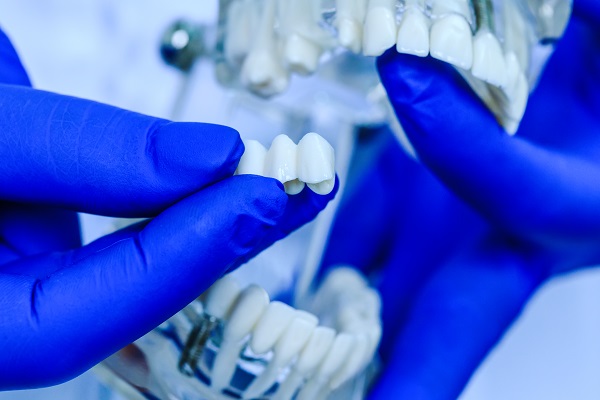What Foods to Avoid If You Have Partial Dentures

Partial dentures can be an affordable way to replace missing teeth. They can restore your smile, and they cost significantly less than alternatives like implants or dental bridges.
Dentists typically recommend partial dentures when a patient has only lost some of their teeth. However, complete denture sets are recommended for those who have lost most of their natural teeth.
Replacing missing teeth with partial dentures does not require any invasive procedures, and your artificial teeth can be ready in as little as two weeks. The oral prosthetic can close up the gaps in your smile and restore the function of your lost teeth.
Getting used to life with partial dentures
Partial dentures can take time to get used to, particularly when it is time to eat. Having an artificial object in the mouth can feel awkward, so expect to go through an adjustment period to learn how to speak and eat with the prosthesis. Here are a few tips on how to eat with partial dentures and foods to avoid.
1. Taking your time
Trying to eat with partial dentures is different from eating with real teeth. But taking the time to learn to eat with artificial teeth is all a part of the process.
Most people do not have to think much about chewing food with natural teeth because the nerves inside them send signals to the brain, signaling how hard to chew. However, the artificial teeth attached to partial dentures are not connected to the brain, making it harder to gauge how hard to chew food. Patients should stick with soft foods like cereals, fish, vegetables, potatoes, and eggs when they first start wearing partial dentures.
2. Avoiding biting with the front teeth
Biting down with artificial teeth at the front of the mouth can cause damage to the oral prosthetic, and it typically feels awkward. It is better to cut things down into smaller sizes that can be placed in the mouth and chewed.
Foods to avoid when wearing partial dentures
Some foods are harder to break down with artificial teeth, and trying to force the issue can lead to the prosthesis becoming damaged. Common foods that patients should stay away from when wearing partial dentures include:
- Nuts: Hard foods like almonds and peanuts can easily damage the artificial teeth attached to partial dentures
- Steaks: This can be tough for some people to avoid, but chewy foods like steaks put stress on the dentures and jaw, leading to pain and discomfort
- Hard candy: Avoid biting down on these at any cost because they can damage partial dentures
- Foods with tiny bits: Foods like popcorn can easily get stuck between artificial teeth, damaging them
Explore partial dentures
Partial dentures might be the right solution for you if you are missing a few teeth. Give us a call or visit our Nampa clinic to set up a consultation with our dentist.
Request an appointment here: https://www.nampaidahodentist.com or call Modern Smiles Nampa at (208) 656-6070 for an appointment in our Nampa office.
Check out what others are saying about our dental services on Yelp: Partial Dentures for Back Teeth in Nampa, ID.
Recent Posts
Implant-supported dentures are often a go-to choice for people who are missing multiple teeth. The truth is, missing teeth can significantly impact a person's overall confidence and likely means that there are health concerns that should be addressed. Missing teeth certainly should not be ignored. If you have been on the fence about implant-supported dentures,…
Think you might need a dental crown? Read on to learn more about this restoration. Dental crowns play an essential role in restorative dentistry and are used primarily for correcting damage to the teeth. According to the Centers for Disease Control (CDC), 91% of Americans over the age of 20 have had cavities. Dental crowns…
Wondering what a family dentist has to offer? Read on to learn more. Sometimes the whole family needs to undergo routine dental procedures. Visiting the family dentist’s office at least two times each year may lower the risk of severe dental health issues including gum disease and tooth decay. The dental professional can provide preventive,…
Thinking about getting dental sealant treatment? Dental sealants are a vital tool for preventing cavities or tooth decay. Tooth decay is a prevalent condition among children and teenagers, and when unchecked, it can lead to other serious oral issues such as premature tooth loss and gum disease. In combination with other preventive care measures such…


